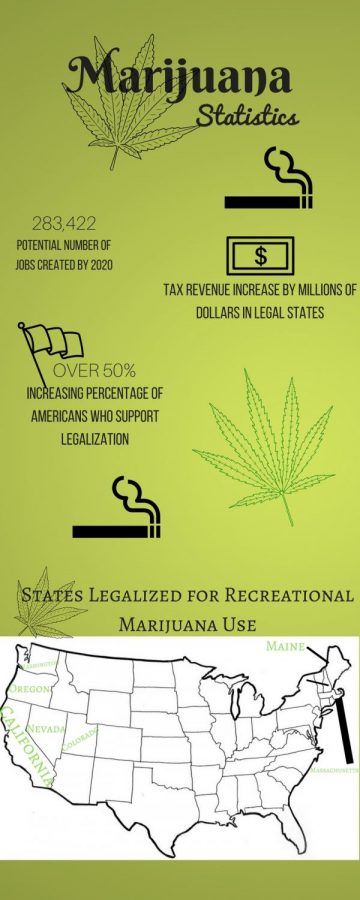The Debate: Legalizing Marijuana on the National Level
After legalizing marijuana at the state level, the federal government considers the ups and downs of legalizing cannabis nationally.
After the legalization of recreational marijuana in Colorado, Oregon and California, several states consider jumping on the bandwagon and legalizing at the state level.
The biggest issue with this, however, is that although cannabis may be legalized in the state of its distribution, it is still illegal at the federal level. So, any money gained in distribution facilities cannot be placed in a bank because it is owned and operated by the federal government.
Special education teacher, Bruce Peterson, believes legalizing cannabis should be decided at the state level because it is similar to the legalization of alcohol. While senior Benjamin Lee agrees that it should be legalized in general.
“It’s kind of like the drinking age; In the beginning, each state had their own laws, but when you make something federal like that, some states are not going to want to follow what the federal rules are, so I think that every state should be responsible for their own laws,” Peterson said. “Let the people decide and vote on their own statutes whether the legalization of marijuana should be allowed.”
“I support the legalization of marijuana,” Lee said. “It allows an expansion of freedoms for everyday Illinoisans, or simply on a broader level, everyday Americans.”
Since it is the government’s job to protect the citizens, the federal and state are at a disagreement. Due to the fact that cannabis is still a schedule one narcotic, there is much controversy over making the drug legal in all 50 states. It is easy to abuse and the growth, distribution and wealth cannot be controlled. At the state level, they cannot really regulate marijuana use or distribution because they do not have the resources that the federal government has.
From an economic standpoint, the state government and the federal government will benefit from the legalization of cannabis since the money will be redistributed into the economy.
“It allows for a greater level of tax dollar collections, which helps us fund roads, schools and bridges and all that kind of stuff we have in both our state and national infrastructure,” Lee said.
There are, however, drawbacks that will likely occur over time. Higher rates of addiction to marijuana are predicted. The feeling of being high rather than the marijuana plant itself is actually the cause of addictions. There will likely be more abuse of the drug and use due to it being easily accessible to people who are of age.
Another controversial issue is determining the equality of pot dispensaries. It is hard to keep track of the strands of cannabinoids that are distributed at each dispensary, which could lead to problems. Eventually, scientists and botanists may be able to isolate the base strands of medical cannabinoids, which would allow for equal distribution at centers.
“If you put any one of these drug companies—Lily, Baxter, Abbott—they would do that if there was a market for it,” social studies teacher Scott Magnuson said. “The problem is that it takes so much money to do research and development and to actually put a product out there because of the restrictions of the FDA at the federal level.”
With Wisconsin and Maine considering to legalize next, few Americans have a clue whether or not the federal government will make a decision anytime soon.



